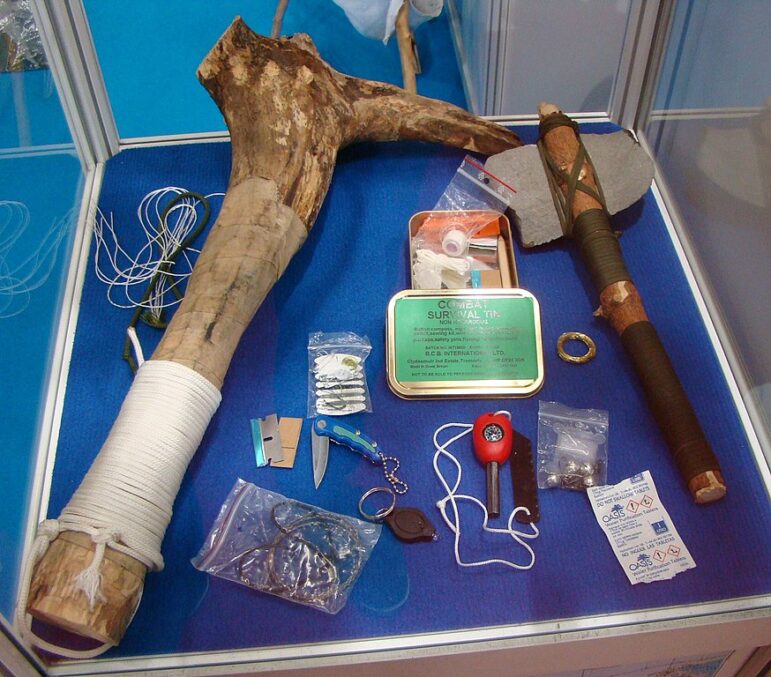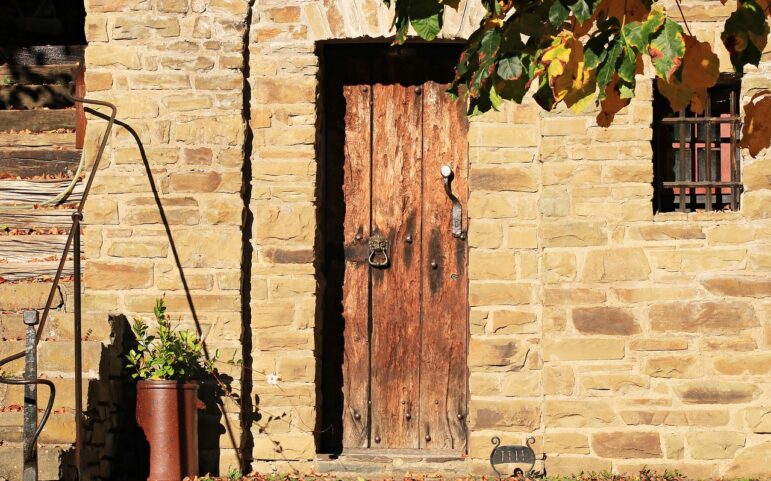The bag I carry is compact, with room to grow on. I knew it was the one I needed when I saw it, but it took me two weeks of muttering about how it was a silly idea to finally trail back to the little store where I found it. It has pockets and compartments and hooks inside the pattern of coyotes and cacti, but it packs down as small as a hardback – or, a wry part of me always suggests, one of the cloth carrying cases the ladies at my church used to have for their Bibles. The handle that runs along its spine makes me feel pleasantly like an old-timey doctor when I carry it, packed light and ready for emergency house calls or long trips with not a lot of time to resupply.
An incomplete list of the items inside the bag always includes:
- Deck of tarot cards
- Small bag of coins (misc)
- Small bag of stones (misc)
- Travel altar
- Incense (rosemary)
- Matches (sandalwood)
- Ring (horseshoe nail, gifted)
- Sheep knucklebone
- Nails
- Red thread
- Lighter
- Salt
- Holey Stone
- Knife (two-edged)
- Sterile lancets
- Single-serve containers of whiskey, honey, ghee, oatmeal, oat milk
Outside of that, the contents of the bag grow and shrink based on inclination and event, gathering themselves over time. On my way to any ritual, or before any trip, I rifle through and pull the items that won’t make it through the TSA, add a few that might come in handy. “Wait,” I sometimes find myself saying at my own door as my friends and I head out. “Let me grab my go bag.”
I no longer remember where I got the idea – an article or a friend or the concept of go bags more generally. But of all the Witchy items I’ve acquired over the years, the go bag is by far the most useful. I’ve pulled it out by campfires and in strange AirBNBs, in the dark of a backyard and in the middle of a mall. Like all my favorite tools, it seems frivolous and self-aggrandizing until it is suddenly vital, containing the missing piece of some spur of the moment working. I have always liked feeling useful, and there’s something inherently satisfying to standing up from a table of Witches and being the one to say “Oh, I’ve got that, hang on.”
But my favorite part of it, the thing that I’ve become reliant on, are the offerings I carry.

A mini survival kit in practice, used to create two improvised tools [Pibwl, Wikimedia Commons, CC 3.0]
I am never sure what a house will want until I get there.
When I travel, I tend to visit houses with character, long lives with loving owners and, if I can get it, a few acres of land. This is true no matter what country I’m in, or what part of the country. Even when the owners have moved on and the land has fallen into disrepair I like to be a good guest. That’s why I carry such a variety. Oat and milk and butter, honey and liquor – they’re all crowd-pleasers. Surely, no matter where I am, the locals will enjoy one of them.
In practice, usually they end up in a slurry, all the ingredients together and left in a cup in the best location I can get access to that feels like a hearth. Sometimes that’s a fireplace – quite often it’s the stove or the furnace, somewhere that a mug can sit without being bothered overnight. It’s the first thing I do once I’ve opened my bag – my way of saying hello to the space, a sign of my good will. Empty everything together, set it out and walk away – what happens or doesn’t isn’t my business. I’m only a visitor.
There have been times it’s changed the whole feeling of a house. In the south, I stayed in a place that was half refurbished, the basement of an old house with a door that led back, and back, and back into bricks and darkness. Arriving, at night, I couldn’t quite work out how to unlock the door, stubbed my toe on the lintel, had to climb over the iron gate. After the offering, the watchfulness of the space – quieted, a bit. I did not sleep easily, but when I did it was dreamless, and I considered it a sign of welcome.
“The woods need something too,” I said, and carried out a stone to toss into the brushes near the fire pit. “Something pretty, I think. They’re used to being loved.” It was intuition born of observation – the carefully trimmed pathways and the rolling wildflower meadow told me that my hosts took care of their space. The rest was just a sense of it – woods that opened wide and gestured in, rather than forbidding entry. It’s the kind of magic that I’m best at – a recognition, a getting to know that leans into what I can see and then goes past it.

Hallway at Olympisches Dorf in Elstal [Severin Messenbrink, Wikimedia Commons, CC 3.0]
It’s the same skill that once made houses so strange, in my travels. I am used to the sorts of spirits that live in or move through places and occasionally, I’ll get the sense that a house is inhabited. Some days it’s a shadow standing in the corner of my eye, or a man in the hallway who isn’t there. Others it’s a sense of being watched. In Wisconsin, in the house with all the doors, lined with windows that looked out on the woods from every direction, the whole building had a sense of ease and comfort- except the room downstairs, the one that led to nowhere and sat almost empty, with a card table awkwardly placed in the center. “I’m not going back in there,” my partner said, immediately after finding it, and we closed all of the doors, locking away the feel of it from the rest of our long weekend. I put the offerings on the furnace, in the room next door, and thanked the house pre-emptively for making sure that whatever trouble waited in there stayed there during our visit.
Because, quite often, the offerings are for the house itself. I am not often there long enough to do the sorts of things I do for my own house – wash, and sweep, and offer the minor repairs that keep it whole and healthy. So instead, I set out the little cup and hope that the house- the wood and stones and bricks themselves, the organism that I’m briefly living in – understands that it means hello and is an offer of sharing. Any inhabitants are welcome, but I figure that they know as well as I do who’s in charge here.
It has taken me years to come to this understanding. Animism, as I first encountered it, talked about the souls of trees and stones. Something made by humans was, in my early estimation, not the sort of thing to have a soul – too small, or too minor, or too sullied. There was nothing holy about an object – except, perhaps, a car. Or a boat. Or a work of art. Or –
The exceptions stacked until I could no longer tell what defined them. Care, perhaps. Attention. Time spent. I centered the human influence even while I claimed it was the thing that separated nature from the ‘unnatural’ and souled items from flat, dead, disposable ones. But even by that definition, I could not argue that a house was not cared for, did not receive attention, did not have people spending time with and in it. Even my understandings of spirits of place suggested that a building should, by all rights, be aware of and in relationship with the people who moved through it.
That understanding crystalized over the course of my travels and grounded itself in my relationship with my own home. I set out, when I moved in, to offer my home something every week – and it took two years to realize that, while many of the inhabitants of my home appreciate a drink now and then, the house itself would rather that I scrubbed the bathtub and tended to that broken floorboard. Once I got the message – besides having a strong word with the allies who had been skimming off the unwanted offerings every week – I felt a little sheepish at how I’d been treating my home. A house is no more the same sort of thing as a tomte than I am the same sort of thing as a cat. It makes sense for it to have different needs, communicate in different ways, just as it takes up a different kind of space. I had been living in a body with rafters for ribs and a metal, burning heart – and I had been feeding it oatmeal.
I rested my head against the wall and pressed a hand to the wood of my door frame – and laughed, petting it like a great cat. “Thanks for being so patient,” I said, not at all sure whether it would make any sense, and then went to get the mop and bucket to say it in another way.

An doorway to a house [Pixabay]
That’s the moment I think about every time I unlock the door to a new house. I step inside and step into an ecosystem, a breathing body with its own inhabitants or lack of them. These days, it’s what I think about when I pull out my little bag and run my fingers across the fabric pattern, play the edge of my thumb along the ridge of its zipper. This is the cord I wove into the window on my wedding day. Those are the stones I took as gifts to Iceland and brought back unwanted. Here is the coin that represents my beloved – here is the ring given by my friend. The magic gathers as the items gather, as the memories gather – and I have begun to think of my little bag as a friend and a companion, a stalwart in my corner with a ready hand and a sense of preparedness.
“Let’s go on an adventure, buddy,” I say, and put my hand on the frame of my door. “Y’all be good while we’re gone.”
The Wild Hunt is not responsible for links to external content.
To join a conversation on this post:
Visit our The Wild Hunt subreddit! Point your favorite browser to https://www.reddit.com/r/The_Wild_Hunt_News/, then click “JOIN”. Make sure to click the bell, too, to be notified of new articles posted to our subreddit.